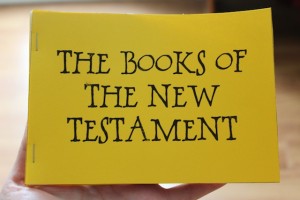 Article: What is the Earliest Complete List of the Canon of the New Testament? By Michael Kruger
Article: What is the Earliest Complete List of the Canon of the New Testament? By Michael Kruger
(original source scholars like to highlight the first time we see a complete list of 27 books. Inevitably, the list contained in Athanasius’ famous Festal Letter (c.367) is mentioned as the first time this happened. As a result, it is often claimed that the New Testament was a late phenomenon. We didn’t have a New Testament, according to Athanasius, until the end of the fourth century.
But, this sort of reasoning is problematic on a number of levels. First, we don’t measure the existence of the New Testament just by the existence of lists. When we examine the way certain books were used by the early church fathers, it is evident that there was a functioning canon long before the fourth century. Indeed, by the second century, there is already a “core” collection of New Testament books functioning as Scripture.
Second, there are reasons to think that Athanasius’ list is not the earliest complete list we possess. In the recent festschrift for Larry Hurtado, Mark Manuscripts and Monotheism (edited by Chris Keith and Dieter Roth; T&T Clark, 2015), I wrote an article entitled, “Origen’s List of New Testament Books in Homiliae on Josuam 7.1: A Fresh Look.”
In that article, I argue that around 250 A.D., Origen likely produced a complete list of all 27 New Testament books–more than a hundred years before Athanasius. In his typical allegorical fashion, Origen used the story of Joshua to describe the New Testament canon:
But when our Lord Jesus Christ comes, whose arrival that prior son of Nun designated, he sends priests, his apostles, bearing “trumpets hammered thin,” the magnificent and heavenly instruction of proclamation. Matthew first sounded the priestly trumpet in his Gospel; Mark also; Luke and John each played their own priestly trumpets. Even Peter cries out with trumpets in two of his epistles; also James and Jude. In addition, John also sounds the trumpet through his epistles [and Revelation], and Luke, as he describes the Acts of the Apostles. And now that last one comes, the one who said, “I think God displays us apostles last,” and in fourteen of his epistles, thundering with trumpets, he casts down the walls of Jericho and all the devices of idolatry and dogmas of philosophers, all the way to the foundations (Hom. Jos. 7.1).
As one can see from the list above, all 27 books of the New Testament are accounted for (Origen clearly counts Hebrews as part of Paul’s letters). The only ambiguity is a text-critical issue with Revelation, but we have good evidence from other sources that Origen accepted Revelation as Scripture (Eusebius, Hist. eccl. 6.25.10).
Of course, some have rejected this list and have argued that it reflects the views not of Origen but of Rufinus of Aquileia who translated Origen’s Homilies on Joshua into Latin. I respond at length to this claim in the above-mentioned article, arguing that Rufinus is much more reliable of a translator than prior scholars have supposed.
The reliability of Origen’s canonical list finds additional support in the fact that it fits with what Origen says elsewhere. For example, Origen enumerates all the authors of the New Testament in his Homilies on Genesis, and this proves to be a remarkable match with his list of New Testament books:
Isaac, therefore, digs also new wells, nay rather Isaac’s servants dig them. Isaac’s servants are Matthew, Mark, Luke, John; his servants are Peter, James, Jude; the apostle Paul is his servant. These all dig the wells of the New Testament (Hom. Gen. 13.2).
One can quickly see that this list of authors (again in classical allegorical style) matches exactly with his list of books. Although Rufinus also translated the Homilies on Genesis, are we really to think that he changed both passages in precisely the same way? It seems more likely that they match with one another simply because they both reflect Origen’s actual views.
Our suspicions are confirmed when we compare these two passages in Origen–the list of books in Homilies on Joshua and the list of authors in Homilies on Genesis–with Rufinus’ own list of canonical books. If Rufinus were guilty of changing Origen’s list to match his own, we might expect a lot of similarities in structure between all these lists. But, that is precisely what we do not find. In fact, Rufinus’ own list differs from Origen’s in a number of important ways (which I detail in the aforementioned article).
In the end, we actually have very good historical reasons to accept Origen’s list as genuine. And if it is, then we have evidence that (a) Christians were making lists much earlier than we supposed (and thus cared about which books were “in” and which were “out”); and (b) that the boundaries of the New Testament canon were, at least for some people like Origen, more stable than typically supposed.
Origen does not offer his list as an innovation or as something that might be regarded as controversial. In fact, he mentions it in the context of a sermon in a natural and matter-of-fact sort of way.
Thus, for Origen at least, it seems that the content of the New Testament canon was largely settled.

